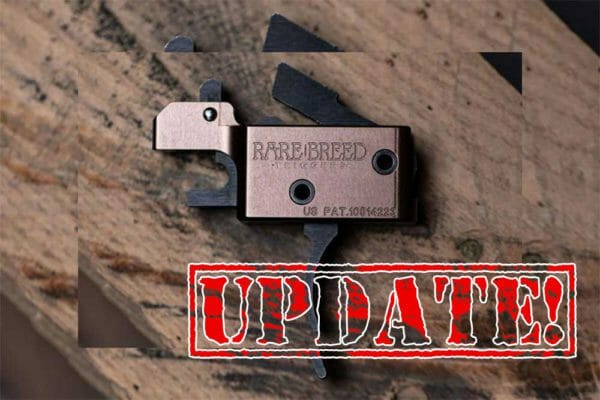
GAINESVILLE, FL -(Ammoland.com)- The Rare Breed Triggers (RBT) vs. Big Daddy Unlimited (BDU) patent infringement saga has finally been concluded.
On Wednesday, October 19, the two parties entered into a consent judgment after months of court battles over Rare Breed Triggers’ claim that Big Daddy Unlimited infringed on its patent over forced reset triggers (FRT). BDU sold the Rare Breed FRT-15 trigger before the online retailer launched its own FRT, known as the Wide Open Trigger (WOT). RBT was adamant that BDU reversed engineered its product to steal market share.
In addition to the consent judgment, the two parties also agreed to a permanent injunction barring BDU from selling the WOT. BDU is also forbidden from insisting that RBT’s patent is invalid or contending that the defendants did not infringe on RBT’s intellectual property (IP). In addition to the WOT being barred from the market, the Powered By Graves ALAMO-15 trigger is also covered under the injunction. Rare Breed Triggers has defended its patent aggressively against other makers of forced reset triggers that it believes uses its patented technology.
The order also stated that the WOT and the Alamo-15 infringed on one or more of the patents owned by RBT. Both parties also agreed that RBT had the manufacturing capabilities to meet customer demand. One of the case’s sticking points was whether RBT could meet the market’s demand. BDU claimed that the Rare Breed Triggers couldn’t keep up with orders. BDU claimed that the triggers BDU sold did not cause RBT to lose market share because RBT couldn’t keep up with demand. But both parties now agree that the infringement cost RBT significant profits and royalties from lost sales.
BDU and RBT entered into a confidential settlement agreement. The amount of money paid to RBT was not disclosed. Due to the order being confidential, that amount will never be known unless someone violates the agreement and leaks the settlement’s dollar value. By doing so, the leakers would be violating a court order.
The injunction does not only stop BDU from making the WOT and the Alamo-15, but it also stops any successor companies from producing or selling any triggers that infringe on RBT’s patents. This clause would prevent BDU from forming another company to sell forced reset triggers. BDU did not produce the WOT. Initially, Big Daddy Enterprises started a separate company called Wide Open Enterprises to make the triggers, and BDU would sell it on its website.
BDU also agreed to give up its right to appeal the court order. In return, the court dismissed the case with prejudice, meaning that Rare Breed cannot refile. Although the case is effectively over, the court maintains jurisdiction. This stipulation means if the court order is violated, the court can act against the violators.
Most patent infringement lawsuits end in settlements. It just makes economic sense to settle the case at some point instead of fighting. Both the CEO of BDU, Tony McKnight and the CEO of RBT, Lawrence Demonico, gave AmmoLand News the exact quote.
The quote reads: “The parties have agreed to a confidential settlement of all disputes.”
Now that the case is settled, RBT can concentrate on its lawsuit in North Dakota against The Justice Department (DOJ) and The Bureau of Alcohol, Tobacco, Firearms, and Explosives (ATF).
About John Crump
John is a NRA instructor and a constitutional activist. John has written about firearms, interviewed people of all walks of life, and on the Constitution. John lives in Northern Virginia with his wife and sons and can be followed on Twitter at @crumpyss, or at www.crumpy.com.

